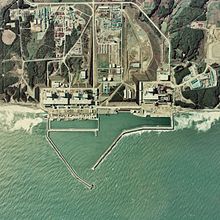Japan Earthquake And Tsunami: End For Nuclear Industry? – Analysis
By RSIS
The nuclear crisis in Japan has received heightened attention in the wake of the tsunami. Will it result in a catastrophic meltdown, as experienced in Chernobyl more than two decades ago, and trigger a global retreat from the nuclear energy industry?
By Alvin Chew
JAPAN IS experiencing its worst national crisis since World War II. A devastating earthquake of magnitude 8.9 – later upgraded to 9 — occurred on the floor of the Pacific Ocean, culminating in a tsunami that overturned marine vessels and uprooted buildings in the Sendai region in north-eastern Japan. Death tolls from the tsunami are expected to reach more than 10,000. Compounding the twin disasters is the shutdown of the nuclear facilities at the Fukushima power plant following explosions.

The Dai-Ichi nuclear reactors at the Fukushima power plant are Boiling Water Reactors (BWR) with an operating history as old as 40 years. Reactor-1, where the top of its containment building exploded, had been in operation since 1971. In February this year, its operating licence was extended by 10 years. All the reactors at the plant take in enriched uranium as fuel, except for Reactor-3, which accepts reprocessed fuel that contains a mixture of plutonium content.
The nuclear plant crisis occurred when the cooling system of the reactor is destroyed in the wake of the tsunami. On-site staff are frantically trying to prevent overheating of the reactor by dousing it with seawater. In addition, ongoing efforts to defuse the pressures on the reactor core is critical to prevent a fallout of radiation particles into the atmosphere.
Lessons for the rest of the world
Japan’s nuclear industry has been under stress in the last 10 years following a series of nuclear accidents mainly due to operators’ negligence. Nuclear facilities are frequently subjected to seismic activities in the country, but the structural integrity of the reactor building remains intact, preventing the possibility of any nuclear meltdown.
Most accidents on nuclear power plants are caused by a string of events that compromise the overall operability of the plant. In 2007, an earthquake in northwestern Japan caused fire and radiation leakage in the ancillary buildings of the Kashiwazaki-Kariwa nuclear power plant. All the seven reactors on the plant had to be shut down to limit any further damage. While the nuclear industry places high emphasis on protecting the nuclear reactor core, additional protection is needed for related facilities and infrastructure.
A good point to learn from this nuclear crisis is the effective evacuation of the residents to a safety zone 20 km away from the plant, in spite of the massive disruption in transportation caused by the tsunami. There is a relatively calm atmosphere among the evacuees as iodine tablets are handed out to protect against harmful radiation. The composure of the society greatly assists the relevant authorities to concentrate on salvaging the affected nuclear facilities.
Impact on ASEAN countries and beyond
With the interest on nuclear energy heating up in the ASEAN region, the nuclear crisis in Japan will undoubtedly stir attention among the Southeast Asian countries – as it has globally. Throughout the world, the crisis provides a favourable platform for anti-nuclear activists to pressure governments to halt their civilian nuclear programmes. In Thailand, the prime minister has announced that nuclear energy is unlikely to be on the agenda as the country gears up for the coming election. Critics of nuclear energy in Indonesia, a country with frequent seismic activities, have voiced their concerns on safety and governance issues, pressing the government to delay plans for developing nuclear power plants.
However, the long-term interest in nuclear energy remains undaunted for the region. Vietnam will proceed to bring in their reactors by 2020. For Malaysia, the government has said it is willing to learn from the Japan nuclear crisis, stressing that the civilian nuclear power programme is still very much intact.
Energy planning for the future requires looking beyond the conventional fossil fuel generation plants. The growth of the nuclear energy industry in the region will have to be complemented by a boost in electricity production as well as expertise. Therefore, the demand for a reliable baseload power source, which is a requisite for economic growth in the region, will place nuclear energy high on the planning list.
Worldwide, nuclear energy will continue to grow as a source of power in the production of electricity so critical for economic growth. The belief in a nuclear renaissance is not founded solely in the movement towards a greener environment. Most of the new nuclear reactors to be built will be in China whose quest for energy has resulted in the government investing heavily in nuclear energy as well as other resources.
It is therefore assessed that most countries will proceed with the building of new nuclear plants. It is unfortunate that Japan resides on the ‘Ring of Fire’, but Tokyo is unlikely to be deterred from continuing with the operation of future nuclear power plants. However, we can anticipate an increase in domestic opposition to nuclear energy in Japan and elsewhere arising from the Fukushima incident.
It is a risk that most nations have to contend with. But certainly, with more than 400 nuclear reactors operating throughout the world, it is a testament that the advantages of nuclear energy outstrip any fears of a nuclear disaster.
Alvin Chew is an Adjunct Fellow at the S. Rajaratnam School of International Studies (RSIS), Nanyang Technological University who specialises in nuclear energy issues.
